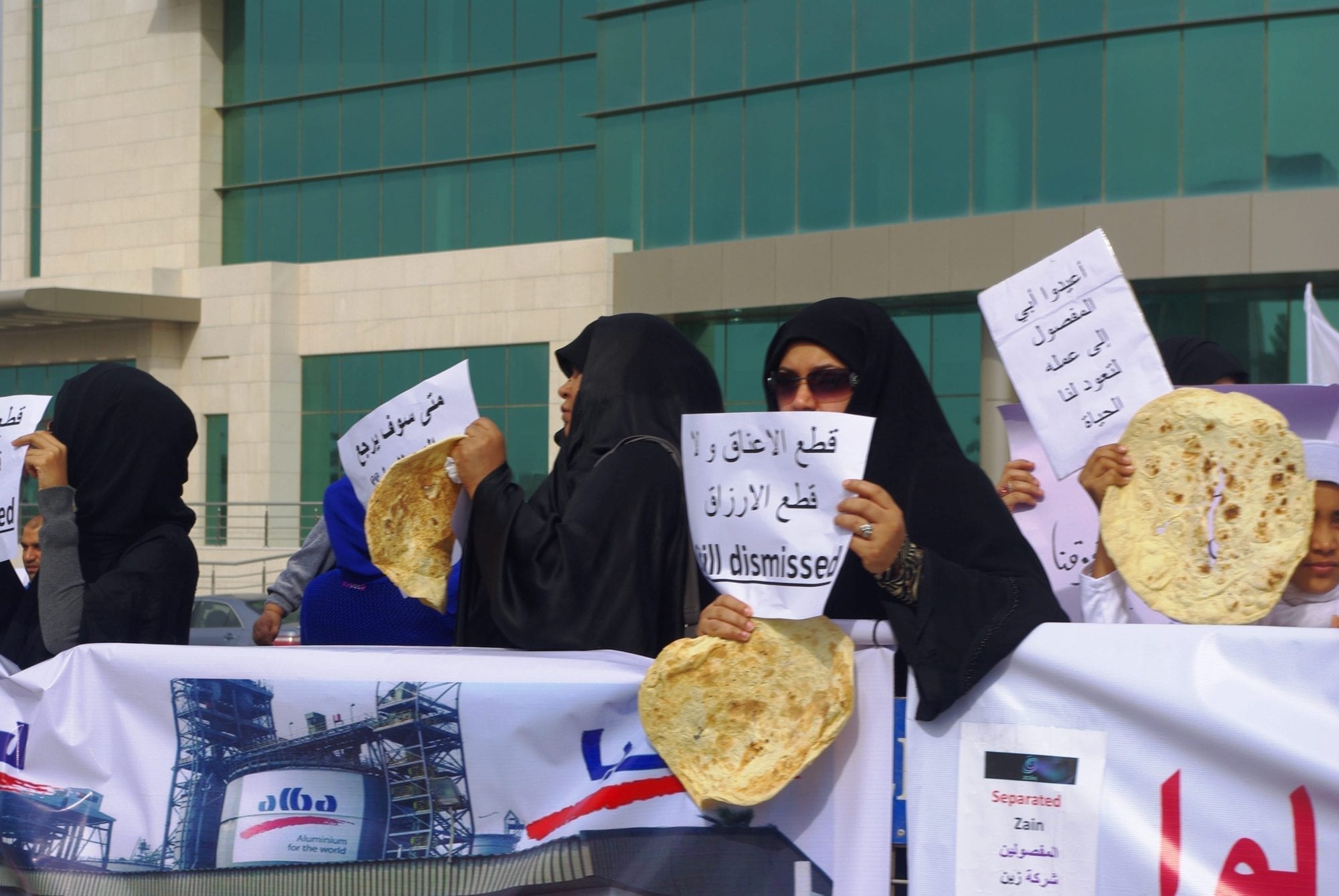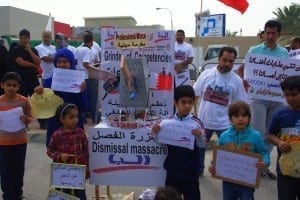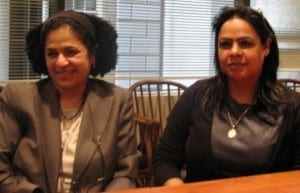
Feb 14, 2014

Many children of fired workers cannot attend school because their parents cannot afford tuition. Credit: Kate Conradt
Three years after the people of Bahrain stood up for a more participatory government, the crackdown on dissent and rampant discrimination in the workplace continues.
Hundreds of workers—including teachers, doctors, nurses and journalists who were doing their jobs when marches were met with violence—have been fired, demoted or sidelined at their workplaces. Many were imprisoned and tortured, including the president of the Teachers’ Association who remains in jail.
During a recent trip to the island country, the Solidarity Center met with workers still without employment despite government commitments to rectify wrongful dismissals. These include workers who were fired in the immediate aftermath of the February 2011 democracy protests and those who are losing their jobs now. One woman was fired after she was imprisoned and tortured for not surrendering a music cassette at a checkpoint. A hotel security guard, trained in emergency medicine, was fired for treating injured protesters. Leading medical specialists, including one of the country’s few rheumatologists, have been denied hospital credentials. Journalists say they have been blacklisted, not only in Bahrain but across Gulf countries, forcing them to seek a way to learn a living far outside their training.
In addition, workers reported that even if they had been reinstated to their jobs, their responsibilities had changed or disappeared. Managers have been demoted. Others have jobs in name only—but often not even a desk to sit at. One airport service worker had his job changed and was told to report to an isolated location and given nothing to do. This discrimination is systematically deepening, workers say, as companies ignore labor law when they fire staff or get rid of workers under the guise of restructuring—only to rehire for the same positions just “eliminated,” as happened with at least one worker at the national airline. Companies are even advertising and hiring from abroad for positions previously held by Bahrainis.
The crackdown also extends to trade unions, with union leaders being pushed out of their jobs and company-friendly unions being established. Longstanding unions no longer have access to managers to negotiate, as they had in the past. And union leaders often find themselves in court for random charges. At Bahrain Aluminum (ALBA) , the company has steadfastly refused to deal with a newly registered independent union, has ignored legal requirements to turn over dues payments and refused to respond to even one of the 40 letters the union has written to it. Meanwhile the country’s labor ministry has done nothing to remedy the situation.
Despite the atmosphere of discrimination and threats, workers continue to fight for their rights—and for the jobs from which they were wrongfully dismissed. They regularly march in front of the Ministry of Labor, hoping that justice will finally be served and that Bahrain can return to a place where worker rights and the rule of law are respected.
Oct 7, 2013
At age 22, N. Naga Durga Bhavani left her small village in India for Bahrain, where she hoped a job as a domestic worker would help pay for her young daughter’s heart surgery. But when she arrived, after paying labor recruiters the equivalent of nearly two months’ wages, she says her passport and papers were taken and she was forced to work long hours, trapped in an abusive environment where she was beaten, her fingers broken.
After she escaped, the Indian Embassy could not help her leave the country because she had no identification. Only through the efforts of the Migrant Forum in Asia and the National Domestic Workers Movement in India, both Solidarity Center partners, did Bhavani’s employer relinquish her passport, allowing her to return home. Bhavani’s experience as a migrant domestic worker is not unique—nor can her employment be called “decent work.”
Today, millions of union members and their allies around the world are marking World Day for Decent Work 2013 to highlight the plight of workers like Bhavani and the millions who toil for poverty-level wages in exploitative working conditions that are unsafe, unhealthy and even life-threatening. Among them are Bangladesh garment factory workers who face locked doors when fires break out; female pineapple workers who experience sexual harassment on Honduran plantations; and Liberian rubber workers forced to carry hundreds of pounds of raw latex across plantations.
It took two months before Bhavani’s employer returned her passport, said Lissy Joseph, national coordinator of National Domestic Workers Movement. Joseph and eight other migrant worker activists, all of whose organizations are members of the Migrant Forum in Asia, were in the United States for the Oct. 3-4 United Nations High-level Dialogue on International Migration and Development. They traveled to Washington, D.C., last week and met with Solidarity Center staff, as well as U.S. government representatives.
Migrant workers, many of whom are domestic workers, are among the most exploited in the world. Yet, “we cannot stop people from migrating because that is the means to their livelihood,” says Joseph. So she and other members of the Migrant Forum in Asia, a regional network of trade unions, non-government organizations (NGOs) and associations, promote the rights and welfare of migrant workers by addressing discriminatory laws and policies, violence against women migrants, unjust living conditions, unemployment in the origin countries and other issues. In short, they are moving forward with the World Day for Decent Work imperative: Organize!
“Our concern in working together is the solidarity of workers around the world,” says Joseph.
The exorbitant and exploitative fees labor recruiters often charge migrant workers and the abusive conditions workers can face after arriving in destination countries are two of the biggest problems for those forced to leave their countries to make a living, the migrant activists told the Solidarity Center. In fact, roughly three migrant workers from Nepal die each day—from abuse, exposure to unfamiliar climates and even suicide, said Nilambar Badal, from the Asian Human Rights and Culture Development Forum Migrants Center in Nepal.
Although destination countries and origin countries may have solid laws for protecting labor rights, too-often they are not enforced. “There is still a big gap in terms of the reality on the ground,” said Ellene Sana, a policy advocate for the Center for Migrant Advocacy in the Philippines, a country that officially says 1.8 million of its citizens are migrant workers, mostly in the Middle East.
And while working conditions frequently are bad for migrant workers, when they return home, there are no jobs “so they re- migrate and the cycle of abuse continues,” said Sanjendra Vignaraja, Solidarity Center program officer in Sri Lanka. In India, there is now a “greater disparity between haves and have nots,” said Joseph.
But India is not unique. Across the globe, the increasing wealth gap often leaves workers with few options, many of which cannot be called decent work. Which is why organizations that bring workers together for a stronger voice are so critical.
Apr 11, 2013

Rula Al-Saffar (left) and Jehan Matooq are among medical professionals in Bahrain where medics continue to experience repression. Credit: Tula Connell
For sick or injured Bahrainis, going to the hospital means risking a prison term—or even death. Describing the “militarization of hospitals,” Rula Al-Saffar, president of the Bahrain Nursing Society, said patients with “head traumas, broken bones or burns” are first interrogated by police to determine if they are involved in protests against the government. Health professionals are only allowed to treat patients after police investigate and clear them for treatment. For some, the delay means death.
In one such instance, “a man fell down the stairs and had a brain hemorrhage,” she said, during an interview at the Solidarity Center. The man could not be treated until the police went to the site to determine if his story was credible. Al-Saffar, in Washington, D.C., this week to update members of Congress and policymakers on the ongoing repression in Bahrain, is among Bahraini medics demanding Bahrain abide by medical neutrality. The Bahrain Center for Human Rights has released a report that details the country’s breach of medical neutrality and violations of injured patients.
Medical neutrality, codified in the Geneva Conventions, is the principle of noninterference with medical services during armed conflict. Internationally recognized, medical neutrality requires the safe transport and treatment of patients and the non-persecution of health professionals for treating ill and injured patients. The issue, says Al-Saffar, is far broader than Bahrain.
“If it happens in Bahrain, it will be the role model in other countries,” she said.
In March, a Bahrain appeals court reversed the conviction of 21 health professionals arrested during pro-democracy protests in 2011. Yet more than two dozen other medics are still in prison. Medics—doctors, nurses and technicians—have been prime targets of government persecution because they treated wounded protestors. Al-Saffar is one of them.
She was put in prison for five months where she was beaten and subject to electro-shock torture. Her 15-year sentence for 12 politically motivated charges was overturned in 2012.
Hassan Matooq, a pediatric nurse, is among those still imprisoned. His younger sister, Jehan Matooq, is traveling in the United States with Al-Saffar to bring attention to his case. Matooq, a medical coordinator for the Bahrain Youth Society for Human Rights, says Hassan was arrested while at work in the pediatric emergency room and given less than 24 hours to find a lawyer to defend him in a military court trial. Unable to contact a lawyer, he was convicted and sentenced to three years in prison for “hatred against the regime,” she said.
The Bahrain Independent Commission of Inquiry last year found that Bahrain officials had grossly exaggerated, if not manufactured, many claims brought against thousands of ordinary people who had been caught up in the 2011 protests, including hundreds of education professionals. Americans for Democracy & Human Rights in Bahrain has issued a detailed list of medics who have been arrested and their current status.
Al-Saffar also described a systematic campaign of terror against Bahraini citizens, in which police tear gas civilians and shoot individuals at close range with pellet guns. Further, Al-Saffar says the regime has barred Sh’ia nursing graduates from getting jobs—despite Bahrain’s severe nation’s nursing shortage. For example, one nurse is responsible for 20 patients at the Samaniya medical complex, the country’s only full-service hospital.
The 2011 peaceful uprising brought together citizens of all religions, but since then, “the government has done a great job of a hatred campaign,” Al-Saffar says. Recently, she has seen signs that the public is not buying such divide-and-conquer efforts. “The people are coming together again.”




